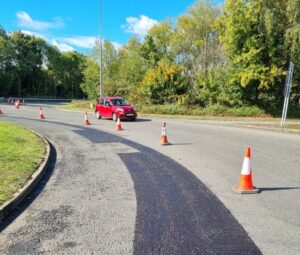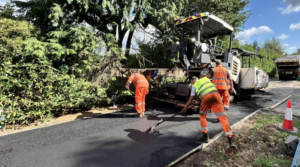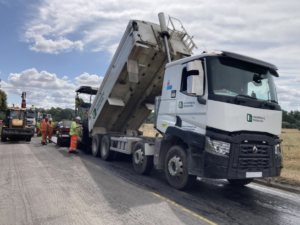Dorset Council has been explaining to residents and businesses how it is reducing its carbon footprint throughout the construction and maintenance processes of its highways network.
Here’s what they had to say:
“We’re making a positive impact on our carbon footprint through the way we construct and maintain roads in Dorset.
In response to the Climate and Ecological Emergency, we have set the ambitious goal of becoming a carbon-neutral council by 2040.
Here are some of the ways we are reducing emissions from our Highways service and helping protect our natural environment.
Low energy road surfaces
Asphalt is the tarmac-like surface you see on roads. It’s a mixture of aggregates (crushed

rock and sand) and other binding materials. It is also used for car parks, pavements, and other surfaces.
Previously, asphalt needed to be heated at a very high temperature to reach the right consistency. Now, by using an additive with the asphalt at manufacture, we can lay it at a much lower temperature, and use more in one visit. This enables faster completion of resurfacing works, minimising time on site for contractors and disruption for motorists and, of course, saves money by using less energy.
Typically, conventional asphalt is produced at around 190 degrees Celsius. Low energy asphalt is effective at 40 degrees less, reducing carbon emissions by around 15%.
We’ve worked closely with our partners, Hanson UK, to develop use of this product in Dorset and are one of the first councils in the UK to use it on a large scale. Government says if all authorities switched to low energy asphalt, 61,000 tonnes of carbon (the equivalent of 300 million miles of car journeys) could be saved every year.
Going electric
We’ve installed a new all-electric container, known as a hotbox, at our Charminster Highways depot to keep asphalt hot while it is stored.

It is the first all-electric asphalt storage hotbox in the UK, further reducing the council’s carbon emissions.
It’s powered by an array of solar panels on our Charminster depot roof, making welcome financial savings, at a time when energy prices are soaring.
Keeping the asphalt stored at a consistent hot temperature enables our crews to take what they need to carry out local pothole and patching work.
The hotbox has replaced our depot’s propane gas-powered container that became inefficient due to heat loss, and increasingly expensive as gas prices rise.

When in use, it runs 24 hours a day, seven days a week using a maximum of four electric elements. It doesn’t use much more energy than a kettle and its purchase price was the same as new gas-powered box.
Using the power of the sun to keep moving

We have an array of 415 solar panels on our Charminster depot roof, made possible thanks to funding secured from the Salix’s Public Sector Decarbonisation Scheme. The Charminster scheme is one of more than 100 Dorset Council solar panel projects to benefit from this £19 million of central government funding.
This renewable energy, costing nothing to generate, is used to charge the depot’s growing electric vehicle fleet and power tools, and help power its buildings.
Excess energy generated by the solar array is fed back into the National Grid. We still need to use some electricity from the National Grid during the night when no solar energy is being generated. However, our next step towards energy self-sufficiency at the depot is investment in battery storage so we can store the excess energy generated during the day to use at night.
Government grant funding has also benefited over 100 of our properties, including schools, to improve energy efficiency with measures such as insulation and highly efficient replacement heating systems.
Recycling our way to high quality resurfacing

Traditionally, we sold our old road surface materials or re-used it as a lower quality coarse base material in highway maintenance projects. Now, thanks to new processes, it can be remade as a high-quality material for our roads.
Our partners Allasso Recycling based in Corfe Mullen can reprocess used material by developing a cold process. This saves energy, and by recycling we’re not taking valuable resources away from our environment.
Last year, we used over 14,000 tonnes of this sustainable surfacing. This is an increase of 8,000 tonnes on both the previous two years. Accelerating the use of sustainable surfacing contributes towards our carbon reduction objectives.
You can read more about the steps we are taking to tackle the Climate and Ecological Emergency (CEE) on our social media pages, and by visiting the CEE section of the Dorset Council website.
























